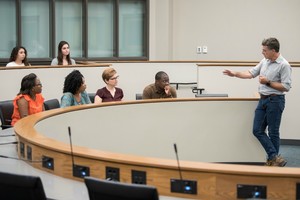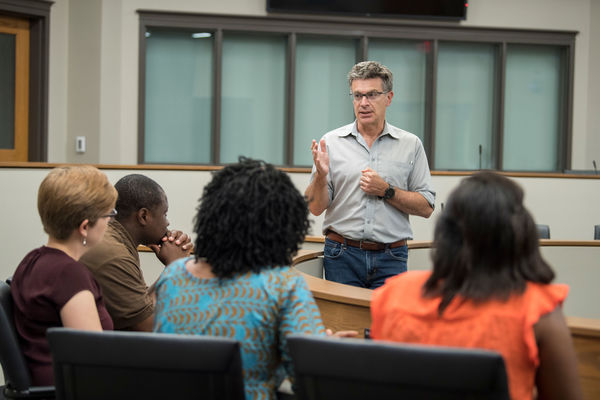 Laurie Nathan teaches in the new mediation room in Jenkins Nanovic Halls on the University of Notre Dame campus
Laurie Nathan teaches in the new mediation room in Jenkins Nanovic Halls on the University of Notre Dame campus
The start of any new academic year is full of firsts, but for the University of Notre Dame’s Kroc Institute for International Peace Studies, this year was special, marking the launch of Kroc’s new mediation program. The program, directed by Laurie Nathan, newly appointed Professor of the Practice of Mediation, will bring the resources and expertise of the Kroc Institute to bear in the field of mediation.
“The mediation program is an important part of Kroc’s new strategic plan that emphasizes the connection between research and practice,” said Asher Kaufman, John M. Regan Jr., Director of the Kroc Institute. “Laurie Nathan is a global leader in the practice of international mediation and at the same time is also a leading scholar on mediation and conflict prevention. He embodies the model of a reflective practitioner that we support at the Kroc Institute.”
The program will undertake mediation research, teaching, training, policy, and practice and will seek to build synergy between these activities.
“In many cases of armed conflict, mediation is the difference between war and peace. It has become the primary peacemaking strategy in civil wars in particular,” said Nathan. “As one of the leading peace institutes in the world, the Kroc Institute has a rare combination of serious scholarly work and committed policy and practitioner engagement. This is exactly the right place to house the new mediation program.”
Nathan has extensive international mediation experience, including as a senior mediation adviser to the United Nations (UN), the African Union and the Intergovernmental Authority for Development (IGAD) in the Horn of Africa. He spent the summer doing mediation training and facilitating dialogue with the United Nations and other actors.
In June, Nathan was the lead designer and trainer at the UN High Level Mediation Course, an annual program held in Montreux, Switzerland. The course is hosted by the UN in partnership with the Swiss government, and participants are senior officials from the UN, regional organizations, and member states involved in mediation. The course aims to deepen participants’ knowledge and skills relating to mediation in high intensity conflicts like those in South Sudan, Syria, and Yemen.
In July, Nathan served as a lead facilitator at a workshop for parliamentarians, ministers, and senior politicians from Macedonia as part of the Track 1.5 Dialogue in Macedonia Project. The Project, run by the Berghof Foundation and Southeast European Association, has supported Macedonia’s efforts to resolve its political crisis and build a national consensus on democracy and respect for the rule of law.
Nathan is also a leader in mediation research and has published articles and reports on conflict prevention, peacemaking and mediation.

Most recently, Nathan was the lead author of a 2018 policy report on the features of successful preventive diplomacy by the UN. The report, entitled Capturing UN Preventive Diplomacy Success: How and Why Does it Work?, was published by the United Nations University and is also available in full on the Kroc Institute website. It refutes the claim that the UN routinely fails at preventing armed conflicts and analyzes successful cases when the UN has worked closely with regional partners to avert war.
This summer Nathan also published research on mediation mandates in the journal Peace & Change and co-authored with Peter Wallensteen, Richard G. Starmann Sr. Research Professor Emeritus of Peace Studies the chapter on “Violence, wars, peace, security,” in a major multi-authored report, Rethinking Society for the 21st Century: Report of the International Panel on Social Progress.
This fall, Nathan is teaching the course “Conflict Resolution: Theory and Practice of Mediation.”
He hopes that, as the program grows, it will attract undergraduate and graduate students from around the world who wish to specialize in mediation research and practice.
“What we are offering students is not only theory and knowledge of the main scholarly debates, but also insight into the actual experience of mediation,” said Nathan. “Mediation usually happens behind closed doors, and it therefore cannot be observed directly by students and researchers. I am able to draw on my own experience, and that of other seasoned mediators, to give students a sense of what happens during mediated negotiations.”
Nathan will also curate a hub for mediation resources housed on the Kroc Institute’s website.
About the Kroc Institute for International Peace Studies
The University of Notre Dame's Kroc Institute for International Peace Studies, part of the Keough School of Global Affairs, is one of the world's leading centers for the study of the causes of violent conflict and strategies for sustainable peace.